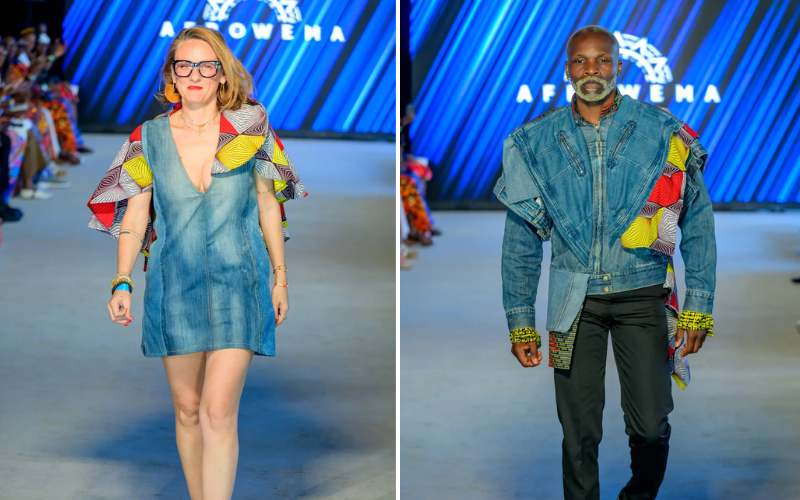In the narrow, bustling lanes of Kibera, Nairobi’s largest informal settlement, a group of young artisans late last year, bent over their sewing machines. The hum of the machines blended with laughter and chatter, punctuated by the sound of scissors slicing through upcycled denim. On the wall, a hand-written sign reads: “Every stitch is a story.”
One of those gowns, stitched with patience in this small workshop, would soon shimmer under the bright lights of London’s Freemasons’ Hall during Africa Fashion Week London (AFWL) 2025.
It was a moment no one in that room dared to imagine – a leap from corrugated iron rooftops to one of the world’s most prestigious platforms for African design.
For Tatiana Teixeira, the founder and creative director of AfroWema, that moment was more than just fashion. It was proof that culture, resilience, and sustainability could walk hand-in-hand onto the global stage.
“We took sustainable African fashion straight into the heart of London,” she said after the show, her voice carrying both triumph and humility. “This was more than fashion. It was culture, impact, and global recognition.”
AfroWema’s debut collection, Savage Beauty, was nothing short of breathtaking. Models walked the London runway in sculpted denim gowns, flowing cotton dresses, and richly patterned ensembles that fused traditional motifs with bold modern silhouettes.
The collection was inspired by the vibrant energy of Nairobi’s streets and the dramatic lines of African architecture. It was also a statement, a “beautiful rebellion” against the waste of fast fashion.
Every piece carried within it a challenge: to rethink what luxury looks like, and to honour the African textiles that have long told stories of identity and heritage.
Teixeira and her team worked with Green Africa to source upcycled denim, collaborated with Kenyan cooperatives for ethically woven cotton, and infused rare Kitenge fabrics from Ghana and Nigeria. Yet, perhaps the most powerful detail was the hands behind the clothes: the tailors and designers of Kibera.
Back in Kibera, 24-year-old tailor Brian Omondi could hardly believe his work had reached London. “I stitched a sleeve on that blue gown,” he said with pride. “When I saw it on the runway, I felt like I was there too.”
For Brian and dozens like him, AfroWema is more than a fashion label. It is a lifeline, offering consistent work, skills training, and a chance to contribute to something far bigger than themselves.
Every stitch carried not just fabric, but also fragments of hope. One seamstress recalled nights when the electricity went out and they continued stitching by lantern light, determined to meet deadlines. “We didn’t just make clothes,” she said. “We made history.”
Founded in 2022, AfroWema is a cross-continental brand linking Kenya and Portugal. Tatiana herself is a bridge between two worlds. Born in Portugal, yet deeply rooted in Kenya through her work in Kibera.
Her dream was never just about clothes. It was about reshaping narratives: that global fashion could emerge from informal settlements, that sustainability could be luxurious, and that African creativity deserved to stand shoulder-to-shoulder with the world’s finest.
“Savage Beauty is more than a fashion statement,” Tatiana affirmed. “It’s a movement proving that sustainability and luxury can, and must go hand in hand.”
The London audience responded with thunderous applause. Critics praised AfroWema’s fearless creativity and its unapologetic embrace of both tradition and rebellion. One international blogger described the collection as “a fresh wind blowing from Nairobi, ethical, bold, unforgettable.”
Yet for AfroWema, the show’s impact went far beyond the catwalk. It positioned the brand as one of Africa’s most exciting new voices in sustainable luxury fashion. And for Kibera, it meant global recognition that talent born in overlooked places can shape style conversations across continents.
